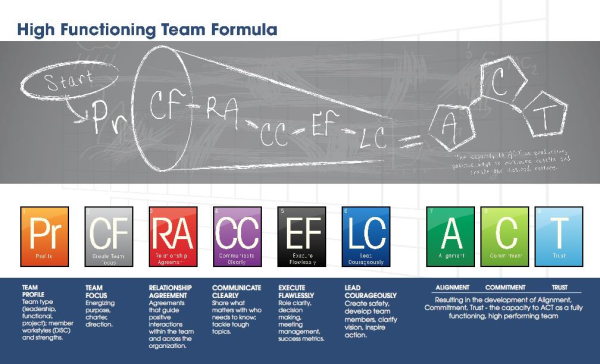
“The leaders who work most effectively, it seems to me, never say ‘I.’ And that’s not because they have trained themselves not to say ‘I.’ They don’t think ‘I.’ They think ‘we’; they think ‘team.’ They understand their job to be to make the team function. They accept responsibility and don’t sidestep it, but ‘we’ gets the credit…. This is what creates trust, what enables you to get the task done.” - Peter Drucker
Google “high performing teams” or “high functioning teams” and you will get several million results; same with “dysfunctional teams”. For many of us who work in a corporate environment there remains a real desire to work on a team who really acts like a team.
We do a lot of work with teams and have found that 70% of the time we’re asked to help because the team is dysfunctional.
Teams struggle the most with:
- Impossible change initiative(s) or turnaround expectations
- A weakly shared vision for success
- A command and control culture
- Too few resources
- Too little trust
- Talent that is too “I” focused vs. “we” focused
- Weak talent
- Lack of peer to peer accountability
- Politics
- Lack of engagement (the team members don’t care)
- Lack of networks built for collaboration
- Silos
For these reasons, we created a formula for helping teams navigate through the good and the bad times:

“The key elements in the art of working together are how to deal with change, how to deal with conflict, and how to reach our potential…the needs of the team are best met when we meet the needs of individuals persons. ” – Max De Pree
While all 6 elements are essential to building a high performing team, we have found that the single biggest lever that will move the dial the most for your team—is the ability to build a relationship. If you do nothing more, taking the time to really get to know the members of your team is by far and away the best thing you can do to build greater functionality!
Moving your team from dysfunction to function is not always easy. Building relationships is a great place to start! What type of relationships do you have with your fellow team members?
“Teams make you better than you are, multiply your value, enable you to do what you do best, allow you to help others do their best, give you more time, provide you with companionship, help you fulfill the desires of your heart and compound your vision and effort.” – John Maxwell
